| Srl | Item |
| 1 |
ID:
115067
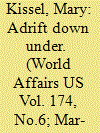

|
|
|
|
|
| Publication |
2012.
|
| Summary/Abstract |
John Winston Howard wasn't just voted out of office after a remarkably steady eleven-and-a-half-year stretch atop Australian politics in November 2007. He lost the prime minister's job to Kevin Rudd, a cheerless career bureaucrat with a skimpy parliamentary record, and lost his local seat to a toothy blond broadcaster with no political experience at all. Yet today the young and the old mob Howard when he wanders out in Sydney, wanting an autograph and a snap with the seventy-two-year-old. They realize that Australia's current leaders have veered the country away from the steady, prosperous path it was on for the past three decades, and in addition to feeling nostalgia for better days they want someone to steer their country back on track.
|
|
|
|
|
|
|
|
|
|
|
|
|
|
|
|
| 2 |
ID:
108143
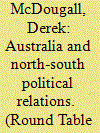

|
|
|
|
|
| Publication |
2011.
|
| Summary/Abstract |
North-South issues as such do not figure prominently in Australia's international policy but are mostly implicit. These issues arise particularly in the context of Australia's relations with countries in its immediate vicinity, including the South Pacific, Indonesia and East Timor. There are also some global issues in the North-South context where Australia is affected. Australian governments, in developing policies relating to this context, have been influenced by a 'practical realism' that puts first priority on Australian interests as perceived by governments at any given time. The way in which those policies have been developed, in both the regional and the global contexts, can be assessed through an examination of issues relating to security and international economic relations. Australia's alliance relationship has a strong bearing on the way Australia approaches the security issues. In relation to international economic issues there are many commonalities with fellow producers of raw materials in the Global South.
|
|
|
|
|
|
|
|
|
|
|
|
|
|
|
|
| 3 |
ID:
107232
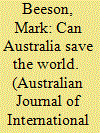

|
|
|
|
|
| Publication |
2011.
|
| Summary/Abstract |
Australian policymakers have always harboured a desire to 'punch above their weight'. On occasions they have succeeded. At a time when Australia's strategic, economic and environmental future is inextricably bound up with that of its immediate neighbours and the wider world, there are compelling reasons for hoping that they still can. This paper explores some of the most important aspects of Australian foreign policy during the Rudd era and asks whether the Australian government can play a constructive-even an exemplary-role in finding solutions for some of the planet's most pressing problems.
|
|
|
|
|
|
|
|
|
|
|
|
|
|
|
|
| 4 |
ID:
093948
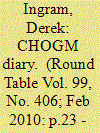

|
|
|
| 5 |
ID:
112472
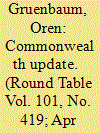

|
|
|
|
|
| Publication |
2012.
|
| Summary/Abstract |
There were clashes between protesters and the police after Mohamed Nasheed was replaced as president of the Maldives by his deputy, Mohammed Waheed Hassan, in what Nasheed said was a coup. A film aimed at raising awareness of the atrocities committed by Joseph Kony, leader of the notorious Lord's Resistance Army militia in Uganda, became an internet phenomenon, being seen by close to 100 million people in a month, but also drew fierce criticism. The Boko Haram Islamist uprising in Nigeria claimed hundreds more lives with the rebels rejecting offers to negotiate. Australia's prime minister, Julia Gillard, defeated a challenge to her leadership by her foreign minister, Kevin Rudd. Fears grew for the nascent democracy in Malawi as a prominent human rights lawyer and critic of President Bingu wa Mutharika was jailed. The king of Tonga, who introduced democracy to the south Pacific nation, died.
|
|
|
|
|
|
|
|
|
|
|
|
|
|
|
|
| 6 |
ID:
103007
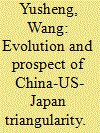

|
|
|
| 7 |
ID:
094543
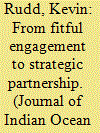

|
|
|
| 8 |
ID:
084597
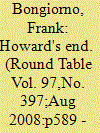

|
|
|
|
|
| Publication |
2008.
|
| Summary/Abstract |
The Australian federal election of 24 November 2007 saw the defeat of the Howard Liberal-National Party coalition government after almost 12 years in office and brought to power a Labor government, the first since 1996, under the leadership of Kevin Rudd. John Howard, Australia's second longest-serving prime minister, became only the second prime minister to lose his own seat at an election. This article summarizes the election result and places it in the context of post-Second World War Australian political and electoral history. The highly unusual character of the large swing to the Labor Party is underlined, as is the rarity of a change of government in Australia since the Second World War. The article also examines the influence of the political leadership of the two major parties in contributing to the changing climate of opinion during 2007 and surveys the campaign itself, underlining the many problems experienced by the Howard government in the final weeks of its life. Finally, the article emphasizes the critical roles that interest rates, climate change and industrial relations all played in fatally undermining the Howard ascendancy. The government, faced with a politically credible and electorally attractive opponent, emerging economic difficulties and a shifting policy agenda, was unable to present itself as equipped to deal with new local and global challenges after a long period in power.
|
|
|
|
|
|
|
|
|
|
|
|
|
|
|
|
| 9 |
ID:
095150
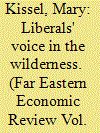

|
|
|
| 10 |
ID:
138095
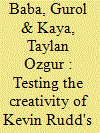

|
|
|
|
|
| Summary/Abstract |
The 2007 Australian Parliamentary Elections brought a new dynamic to Australia’s foreign policy: the Kevin Rudd factor. The Prime Minister sought to develop a more proactive and multi-faceted foreign policy around ‘Creative Middle Power Diplomacy’. This study aims to cast light on the dynamism in Australia’s Foreign Policy with Kevin Rudd within the framework of middle power activism. The research firstly focuses on the difficulties of defining and classifying middle powers through which it will put forward specific ‘commonalities’ for successful middle power foreign policy outcomes. The study of the EU–Australia Partnership Framework and the Asia-Pacific Community proposals – both of which were priorities for Kevin Rudd – reveal the potential and limits of middle power activism. This study argues that in today’s world, middle powers have growing potential to pursue specific foreign policy goals but their ability to achieve these goals is constrained by Great Powers’ interests and consent, and also by the nature or ‘commonalities’ of middle power diplomatic practice.
|
|
|
|
|
|
|
|
|
|
|
|
|
|
|
|